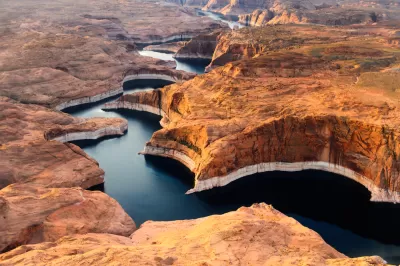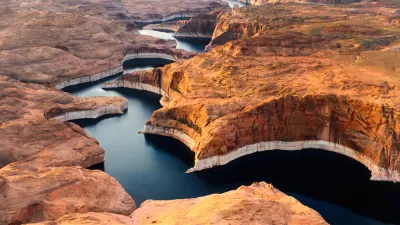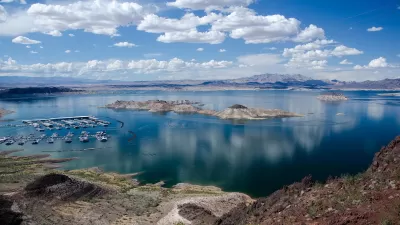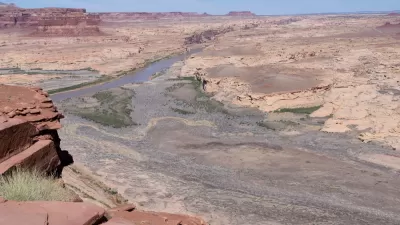States in the Lower Basin of the Colorado River will contribute more water in order to keep reservoirs from reaching critically low levels.

"Arizona, Nevada and Mexico will start taking less water from the Colorado River in January as a hard-fought set of agreements kicks in to reduce the risk of reservoirs falling to critically low levels," reports Ian James. The Lower Basin agreement also means California will contribute water to Lake Mead if reservoir levels drop below a certain point.
This agreement, as well as Upper Basin plans and an additional accord with Mexico, is part of an effort to keep reservoir levels sustained for the next seven years. The effects of chronic overuse in past decades and years of drought are now being exacerbated by climate change, and the drought contingency plans are an attempt to get out ahead of the problem.
"Water managers and supporters of the latest Colorado River deal have called it a ‘bridge solution’ to get the region through 2026, by which time new guidelines for managing shortages are supposed to be in place," says James.
FULL STORY: Water cutbacks set to begin under deal designed to ‘buy down risk’ on Colorado River

Maui's Vacation Rental Debate Turns Ugly
Verbal attacks, misinformation campaigns and fistfights plague a high-stakes debate to convert thousands of vacation rentals into long-term housing.

Planetizen Federal Action Tracker
A weekly monitor of how Trump’s orders and actions are impacting planners and planning in America.

In Urban Planning, AI Prompting Could be the New Design Thinking
Creativity has long been key to great urban design. What if we see AI as our new creative partner?

King County Supportive Housing Program Offers Hope for Unhoused Residents
The county is taking a ‘Housing First’ approach that prioritizes getting people into housing, then offering wraparound supportive services.

Researchers Use AI to Get Clearer Picture of US Housing
Analysts are using artificial intelligence to supercharge their research by allowing them to comb through data faster. Though these AI tools can be error prone, they save time and housing researchers are optimistic about the future.

Making Shared Micromobility More Inclusive
Cities and shared mobility system operators can do more to include people with disabilities in planning and operations, per a new report.
Urban Design for Planners 1: Software Tools
This six-course series explores essential urban design concepts using open source software and equips planners with the tools they need to participate fully in the urban design process.
Planning for Universal Design
Learn the tools for implementing Universal Design in planning regulations.
planning NEXT
Appalachian Highlands Housing Partners
Mpact (founded as Rail~Volution)
City of Camden Redevelopment Agency
City of Astoria
City of Portland
City of Laramie





























